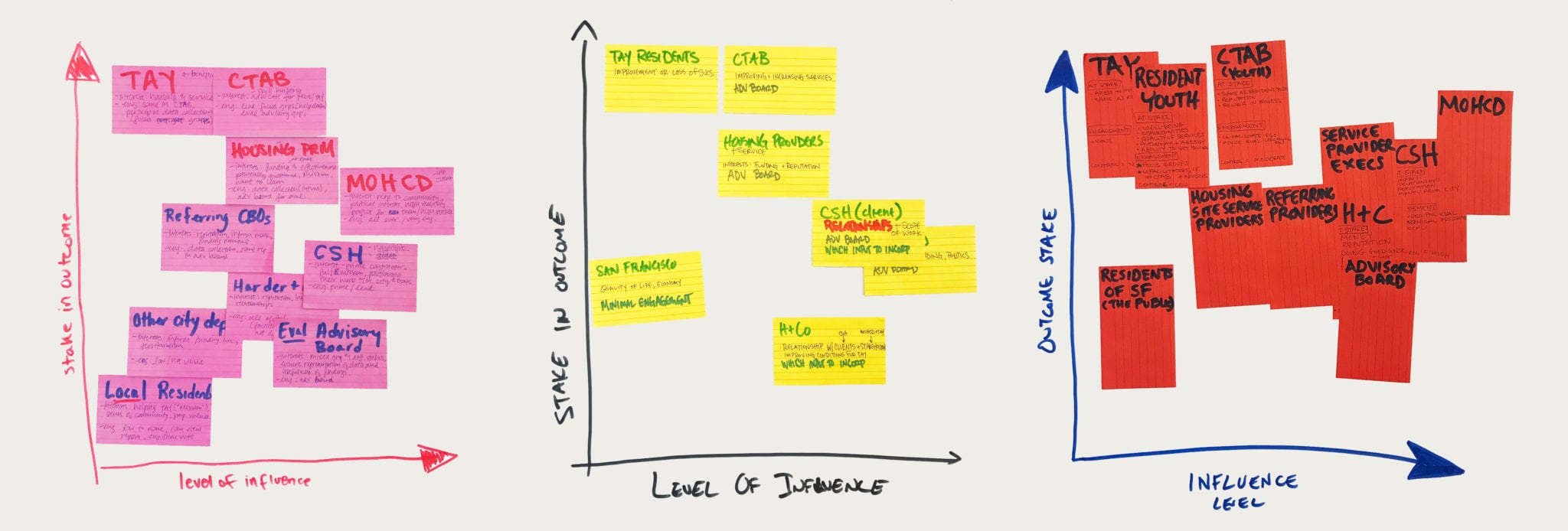

There is growing acknowledgment in the social and public sectors of the importance of creating conditions for meaningful and inclusive community engagement in research and evaluation. A recently launched initiative, funded by the W.K. Kellogg Foundation, The California Endowment, and The Kresge Foundation, also illustrates the importance of equity in the field of evaluation. At Harder+Company Community Research we have long been committed to developing and using practices that ensure community voices and perspectives are central to our evaluation work. Our internal Culturally-Based Consulting workgroup creates tools and opportunities for our staff to reflect upon our own culture and biases, and the diverse cultures of the communities and stakeholders we work with. These activities equip our team with the skills to foster genuine and respectful collaborations that help our clients advance social change.
We use learning circles to strengthen our internal capacity and incorporate principles of diversity, equity, and inclusion throughout all aspects of our practice. A recent series of learning circles explored power and privilege in evaluation, and the impact of structural racism on our work and the populations we work with. The goals of these power and privilege learning circles are to:
- Develop a common understanding of terms related to power and privilege, with a particular emphasis on racial equity
- Understand how power and privilege structure barriers and opportunities
- Learn how to identify and assess power and privilege dynamics among diverse stakeholders, clients, and project teams
- Discuss and learn how to anticipate and address power, privilege, and equity issues that arise in our projects
Recognizing that we at first needed to ensure staff had a common understanding of key terms like power, prejudice, oppression, racism, and white privilege, we used our first learning circle to define these key terms and allow staff to reflect on their personal experiences and identities. Building on that first conversation, the second learning circle used a power analysis mapping activity to help staff understand the different levels of power that may exist among stakeholders on a project.
The power analysis mapping activity unpacks how stakeholders’ diverse interests, power, and privilege impacts the relationships between Harder+Company project teams, clients, and other stakeholders. Stakeholders can include both individuals and organizations that will be affected directly, or indirectly, by the outcome of a project. We work with a broad range of stakeholders in our projects – foster youth, family caregivers, city staff and foundation boards.
For the activity, we organized staff into small groups of 4-8 members to review a case study adapted from a past Harder+Company project that included a range of stakeholders representing city government, local community-based organizations, and individuals accessing services. After reading the case study, we asked each group to identify all of the stakeholders on index cards, noting respective roles (i.e., funder, service provider, grantee, client, and others) and interests in the project. Staff then positioned the stakeholders on a graph according to each stakeholder’s level of influence within the project and their stake in the outcome of the project as illustrated in the photos below.

Following the small group activity, we reconvened to compare each group’s analysis chart and discuss the following questions:
- Where are there opportunities to strengthen stakeholder engagement within the project to produce data and information that is meaningful for all stakeholders involved (e.g., data collection methods, process tools, engagement strategies)?
- What are some potential challenges or conflicts that may arise among stakeholders during the project? Do any stakeholders have interests that conflict with the project?
- Are there any opportunities to reduce discrepancies in influence and stake? For example, how can we engage a community member receiving program services who has a high stake in the outcome of the project but minimal influence?
The group conversation following the activity enriched our understanding of the complexities of power and privilege and helped to build staff capacity to identify and manage complex power dynamics within projects.
Completing the stakeholder mapping activity with staff yielded several notable takeaways:
- The discrepancy between interests and power. Power analysis mapping can be a useful tool for understanding and addressing stakeholder power and interest in a project. For example, our maps helped identify a discrepancy where a stakeholder who had the most at stake, the program beneficiaries, had limited influence in the evaluation. This insight led us to identify ways we could ensure this stakeholder group was engaged in a meaningful way. The activity can also be conducted with clients as a strategy for identifying and mitigating potential conflicts due to differences in influence and stake among project stakeholders.
- The value of self-reflection. Our experience with power analysis mapping prompted discussion and reflection about our role as consultants and the power and privilege associated with that role. This included discussion of how perceptions of the power and privilege consultants possess may differ by stakeholder. For example, community-based organizations may think that consultants can influence decisions about future funding, a position of power. The power associated with race, gender, class, and other identities impacts these dynamics as well. Our power analysis activity underscored the importance of having ongoing discussions about our role as consultants in the array of projects that we engage in.
Setting aside time for staff to engage in reflection and dialogue about power, privilege, and equity within our work is essential to strengthening our practice as culturally-responsive evaluators. We look forward to sharing this practice with our peers at this year’s conference of the Center for Culturally Responsive Evaluation and Assessment (CREA) in Chicago.
The Harder+Company Culturally-Based Consulting Workgroup includes Cristina Magaña, Jenine Spotnitz, Jennifer Moore, Maricela Piña, Shya Castillo, and Sophia Lee.
